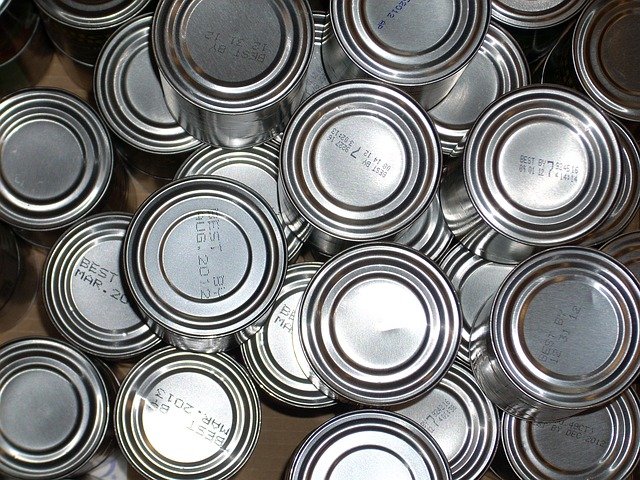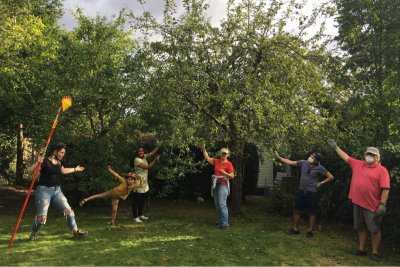 VideoKath Dalmeny opening the workshop with a reflection on resilience
VideoKath Dalmeny opening the workshop with a reflection on resilience
The pandemic has highlighted the major cracks in our food system, whether that be the fact millions of people are unable to afford or access food, the way a lot of our food is unfairly produced or how much having a fairer food system is prioritised nationally and locally. Many of these cracks existed prior to the pandemic but as the country starts to open up again we have a new chance to address them as we look ahead to recovery and building back better.
Recovery is not a singular event, action or goal though, it takes time and requires resilience, but what does resilience mean? It’s the new buzz word, yet it can be one of those abstract terms that is meaningless without context and thought. Who better to give it some thought than food poverty alliances that are working hard to tackle the root causes of food poverty? That’s why Food Power launched a round of financial support for alliances to start to develop a vision for what local food resilience looks like in their area.
As part of this support, 15 alliances received financial support to deliver projects that aim to help build local food resilience. We recently brought these alliances together for a workshop to explore their thinking and help build a shared understanding of what we mean by local food resilience. As ever the discussion was insightful and empowering, so it had to be shared.
The group described resilience as the ability of a system – and the people within it – to keep going and to keep adapting and to withstand shocks and stresses. So what does that mean in the context of local food resilience?
Resilience not reliance
We need to move towards resilience and away from reliance. Meaning we need to be looking beyond basic food boxes, meeting ‘lowest common denominator’ of needs, towards redesigning entire food systems. This should start by recognising that the inequalities we’re seeing during this pandemic aren’t new, they have simply been exacerbated by it. Many of the issues have been caused by structural factors and decisions that over time have undermined resilience and led to this point. For example, how the food system is organised or the inadequate welfare safety net. Acknowledging these factors will help ensure the status quo is not embedded and we don’t trap communities in the same cycle of poverty. Instead, we need a pathway to self-reliance for individuals and communities that ensures reliable access to affordable, nutritious food in a dignified way, with choice and culturally appropriate options.
Resilience principles
Alliances work in differing contexts so it’s important the vision for resilience can be translated to their different communities. To aid this, the group proposed developing some resilience principles to use as a guide for all alliances, local authorities and decision makers, similar to the dignity principles developed by Nourish. Some potential themes emerged when discussing what we would be building resilience against and what is needed to deliver resilience. These include:
- Connection and collaboration: Recognise and promote the strengths in connection by seeking out collaboration with organisations and networks. For example, markets, schools, food partnerships and local authorities. Share the learning from this joint work through networks, partnerships and use it to drive change and avoid duplication.
- Cultivate and maintain your internal capacity: Invest, where possible, in skills, systems, facilities and knowledge and keep a record of what works and who has the tools, skills and premises to help.
- Lead by example on finances: Secure income generation through grants, donations, running memberships schemes or adopting social enterprise models and pay the real living wage.
- Integrate with other types of support: Food poverty is primarily driven by poverty, so to tackle the root causes we need to be integrating other types of support such as income maximisation and skills building.
- Maintain your own personal resilience: Work during Covid-19 has been challenging to say the least but to build our community’s resilience we must look after our own, both as individuals and across organisations and alliances
- Measure what matters: Funding requirements often push us to measure the need rather than the success. Instead of measuring the number of food parcels that have been delivered we should begin measuring how many people have been helped along the pathway to self-reliance, as ultimately that is what our work should be achieving.
- Normalise the approach: Resilience may feel like a new idea but it’s actually what we’ve always been working towards. We should use this new framing to drive the cultural shift, create a movement and make this work everybody’s business.
Language matters
Language is a powerful tool in reframing issues and building movements. Household food insecurity can often be discussed in a negative framing – because it is negative, people shouldn’t be food insecure, but could the movement benefit from shifting to a more positive framing? Something that offers a more active term rather than abstract language which the term ‘resilience’ often falls into. Some alliances discuss food equality or food justice. Could we adopt this language at scale to help own the narrative and drive change?
Overall, we may have ended up with more questions than answers but it’s a start. Further conversation with all members of the Food Power network, allies and others is needed to develop these at the Food Power Festival (17 – 20 May). Sign up if you would like to join us and let us know what you think of the thoughts above by emailing Cecily, we’d love to hear them.
Food Power: Food Power is an exciting new programme working with local communities across the UK to strengthen their ability to reduce food poverty.







